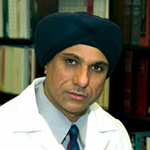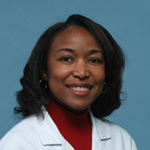Doctors at Washington University School of Medicine in St. Louis are seeking volunteers for a clinical trial testing an investigational device in patients with severe high blood pressure that can’t be controlled with aggressive medical treatments.

Led by interventional cardiologist Jasvindar Singh, MD, associate professor of medicine, and hypertension specialist Angela L. Brown, MD, assistant professor of medicine, the study is intended for patients who are taking at least three different types of blood pressure medications at the highest tolerated doses, but continue to have trouble controlling their blood pressure. Both doctors treat patients at Barnes-Jewish Hospital.
The investigational device targets nerves in the arteries that deliver blood to the kidneys. The kidneys play an important role in controlling blood pressure through the sympathetic nervous system – the part of the nervous system that governs the fight-or-flight response. In people with uncontrollable high blood pressure, nerves in the kidney’s arteries often fire at abnormally high rates.
Using the investigational device, doctors insert a catheter through the groin and into the kidney’s arteries, where they apply radiofrequency energy, or heat, to interrupt the signals from some of these overactive nerves. By changing the nerve firing, the kidneys may be less active in secreting chemicals that lead to blood pressure elevation.

In the current study, patients will be randomly assigned to get the procedure with the investigational device or to a control group. Patients will not know which group they are in until their six-month follow-up visit. At that time, patients in the control group will be offered the option of receiving treatment with the device, if they choose. All patients will continue taking their medications during the trial.
This study has a unique design since patients in the control group may have the option to receive treatment six months after they are enrolled in the trial. According to Singh, the design offers the potential to help all trial participants if the device demonstrates benefit.
To participate in the study, patients must first undergo screening tests to determine whether they are eligible. Their systolic blood pressure (the top number in a blood pressure reading) must average at least 160 millimeters of mercury (normal is considered 120 or less). And they must be taking at least three blood pressure medications at the highest tolerated doses.
Patients who fit the high blood pressure criteria will undergo an imaging procedure called an angiogram to be sure the anatomy of the arteries qualifies them to participate. During the angiogram, a catheter is used to inject a dye into the arteries. Those in the investigational treatment group will undergo the study procedure at the same time. Patients will not know whether they have been assigned to the control group or the treatment group right away, since they will not know whether they underwent the angiogram alone or both the angiogram plus the investigational procedure.
Patients in the study will be followed for three years. During this time, they will monitor their own blood pressure at home. And periodically, they will need to come to Barnes-Jewish Hospital for clinic visits and laboratory tests, including blood pressure recordings, blood and urine samples, and X-ray and ultrasound imaging of the kidneys’ arteries.
All costs of the investigational treatment and testing, including an overnight stay at Barnes-Jewish Hospital, will be paid for by the trial. Blood pressure medications that patients already are taking and must continue taking during the trial will not be paid for by the trial. Participants will receive small compensation for their time. For more information, contact Marjorie Palazzolo at 314-362-1962 or mpalazzo@dom.wustl.edu.
The study is sponsored by Medtronic Inc., which makes the Symplicity Catheter System.
Washington University School of Medicine’s 2,100 employed and volunteer faculty physicians also are the medical staff of Barnes-Jewish and St. Louis Children’s hospitals. The School of Medicine is one of the leading medical research, teaching and patient care institutions in the nation, currently ranked sixth in the nation by U.S. News & World Report. Through its affiliations with Barnes-Jewish and St. Louis Children’s hospitals, the School of Medicine is linked to BJC HealthCare.